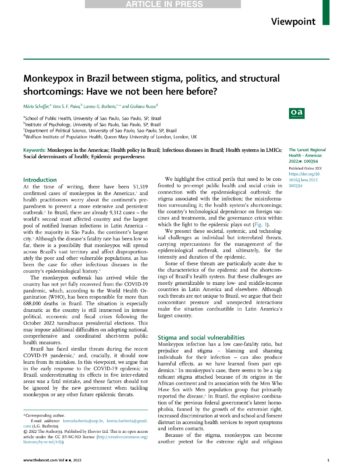Introduction
At the time of writing, there have been 51,519 confirmed cases of monkeypox in the Americas, and
health practitioners worry about the continent’s preparedness to prevent a more extensive and persistent outbreak. In Brazil, there are already 9,312 cases – the world’s second most affected country and the largest pool of notified human infections in Latin America – with the majority in São Paulo, the continent’s largest city. Although the disease’s fatality rate has been low so far, there is a possibility that monkeypox will spread across Brazil’s vast territory and affect disproportionately the poor and other vulnerable populations, as has been the case for other infectious diseases in the country’s epidemiological history.
The monkeypox outbreak has arrived while the country has not yet fully recovered from the COVID-19
pandemic, which, according to the World Health Organization (WHO), has been responsible for more than 688,000 deaths in Brazil. The situation is especially dramatic as the country is still immersed in intense political, economic and fiscal crises following the October 2022 tumultuous presidential elections. This may impose additional difficulties on adopting national, comprehensive and coordinated short-term public health measures.
Brazil has faced similar threats during the recent COVID-19 pandemic, and, crucially, it should now learn from its mistakes. In this viewpoint, we argue that in the early response to the COVID-19 epidemic in Brazil, underestimating its effects in five inter-related areas was a fatal mistake, and these factors should not be ignored by the new government when tackling monkeypox or any other future epidemic threats.
We highlight five critical perils that need to be confronted to pre-empt public health and social crisis in connection with the epidemiological outbreak: the stigma associated with the infection; the misinformation surrounding it; the health system’s shortcomings; the country’s technological dependence on foreign vaccines and treatments, and the governance crisis within which the fight to the epidemic plays out.
We present these societal, systemic, and technological challenges as individual but interrelated threats, carrying repercussions for the management of the epidemiological outbreak, and ultimately, for the intensity and duration of the epidemic.
Some of these threats are particularly acute due to the characteristics of the epidemic and the shortcomings of Brazil’s health system. But these challenges are mostly generalizable to many low- and middle-income countries in Latin America and elsewhere. Although such threats are not unique to Brazil, we argue that their concomitant pressure and unexpected interactions make the situation combustible in Latin America’s largest country.


